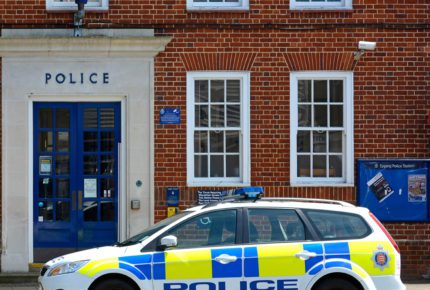

If you or a loved one has been arrested, it is no doubt a daunting time for you. One of the first questions on your mind is likely to be how long can the police keep you in custody before they make a decision on whether to charge you? You might also be asking yourself what the procedure is that the police will follow when you are taken into custody. Perhaps you are also wondering what your rights are in custody, and what happens when you are released from police custody. We answer these questions in this article and tell you where to turn if you need more help.
Whilst you may be fearing the worst, it is worth remembering that although over 1 million people are arrested in England and Wales every year, only 7.8% of reported crimes result in a prosecution. Therefore, being arrested will not necessarily result in a criminal conviction. Understanding the steps taken by the police in criminal investigations will help you to ensure that your rights are respected.
What happens when you are taken into police custody?
Once a person is placed under arrest and taken into police custody, they benefit from the protection of the Police and Criminal Evidence Act 1984 (PACE). This Act was passed in order to balance the police’s need to investigate crimes with legal protections for the detained person, which prevent the abuse of police powers. The types of abuse PACE was intended to tackle include mistreating a detained person, preventing their access to legal advice, or keeping them in detention for an unacceptably long period of time. Under this legislation, codes of practice have been developed that prescribe how police officers are required to treat detainees and the rights to which suspects are entitled.
When you are taken into police custody, you will first appear before the custody sergeant, who is obliged to inform you of why you have been arrested. The custody sergeant is obliged to inform you that you have the right to:
- free and independent legal advice
- to have someone informed of your arrest
- an interpreter if you need one
You should be given written notice of these rights.
The police will then take your biometric information such as your fingerprint. If you refuse to cooperate with your fingerprint being taken, the police have the right to use reasonable force in order to obtain it. The rules regarding the taking of biometric information are set out in Code D.
You will then be placed in a cell prior to being interviewed. Before putting you in a cell, the police must check whether you appear to be unwell or at a risk of self-harm. If you are unwell, a health care professional must be called.
Before interviewing a suspect, the police must be satisfied that they are physically and mentally fit. If there is any doubt in this regard, the police must ask a healthcare professional to perform an examination of the suspect.
Where the suspect has requested legal representation, they must be given the opportunity to consult with their police station representative prior to the interview. The representative will then attend the interview with the suspect. If the suspect declined legal representation, the police must remind them of their right to legal advice before commencing the interview.
If, during your time in custody, you are alleged to have committed further offences, the police must inform you of what further offences you are also arrested for. Examples could be assaulting a police officer, or obstructing a police constable in the execution of their duty.
If you feel you have been treated unfairly whilst in police custody, you can request a copy of your custody record. This is a document that should record all the events that occur whilst you are at the police station, such as the time that you were seen by the healthcare professional, the time of interview, and the time of your release.
What happens when you are released from police custody?
After the interview, the police will then usually make a charging decision. If the suspect is charged, they will either:
- be kept in police custody until they appear at the magistrates court, or
- bailed to appear at court
If the police’s investigation has been completed, the suspect may be released with no further action to be taken. Where the police’s investigation is ongoing but they are not yet in a position to charge, they may release the suspect on police bail with bail conditions, or alternatively they may be ‘released under investigation’. This is where the suspect is released without bail conditions, but the investigation is still ongoing.
How long can the police keep you in custody without charging you?
The general rule is that a person cannot be detained at the police station for more than 24 hours prior to being charged (s41 PACE). The 24 hour period runs from the time of arrest, or the time of arrival at the police station, whichever is earlier.
If no charging decision has been made within this 24 hour period, the police can extend the period of detention up to 36 hours. This can only be authorised by the superintendent of the police station (s42 PACE). The superintendent must be satisfied that the following criteria apply:
- Detention is necessary to secure or preserve evidence relating to an offence (for example, to seize goods from an address or interview further witnesses)
- The offence is an indictable offence (i.e. one which could be heard in the Crown Court)
- The investigation is being conducted diligently and expeditiously
These reasons must be recorded in the detainee’s custody record.
Should the police wish to detain the suspect beyond 36 hours, they may only do so by obtaining a warrant from the Magistrates’ Court (s43 PACE). If such a warrant is granted, the detainee may be kept in police custody for up to 72 hours in total.
The exception to these time limits is if the detainee is suspected of terrorism. Under s23 of the Terrorism Act 2006, individuals suspects of terrorism offences can be held for up to 28 days without charge. Laws on terrorism also restrict the right of a suspect to legal advice in certain circumstances.
What are your rights when held in police custody?
Code C of the PACE codes of practice states that a detained person should not be held in police custody longer than necessary. Cases must be dealt with expeditiously. A detained person must be released as soon as it is no longer necessary to keep them in detention. This means that the police are not permitted to ‘punish’ a person by unnecessarily detaining them.
Police offers are permitted to use reasonable force in the execution of their duties. For example, if a detained person refuses to go into their cell, officers are entitled to use reasonable force to put them in the cell. If the detained person is behaving aggressively, it might be justifiable for officers to use approved police use of force manoeuvres to put the person on the ground. Arbitrary or excessive force, or behaviour which is intended to degrade or humiliate a detained person is not permitted. Therefore, kicking a person who is already on the ground, spitting on them, or being verbally abusive towards them is unacceptable police behaviour.
An estimated 39% of individuals detained in police custody have some form of mental disorder. One of the greatest challenges facing police is how to deal with these individuals, who often require more care and attention than a person who does not suffer from mental health issues. If a detained person is considered to be at risk of self-harm, precautions must be taken. Depending on the perceived severity of the risk, you may be given special clothing to wear or placed under constant supervision. Where a person appears to lack mental capacity, the police will need to give consideration to whether they should be sectioned under the Mental Health Act of 1983.
Other key rights to which detained persons in a police station are entitled to include:
- The right to legal advice – this comprises the right to free and independent legal representation, which includes a confidential consultation prior to the police interview and representation during the police interview.
- The right to have a person informed of their arrest – the detained person will not usually be allowed to make multiple telephone calls or have lengthy conversations.
- For juveniles and persons classed as vulnerable – the right to have an ‘appropriate adult’ present at the police station. This adult could be a parent, friend, carer, or a professional such as a social worker.
Where to get further help
If you or a loved one has been arrested and you need help, or if you are concerned that you or they have been treated unfairly at the police station, get in touch with the team at Stuart Miller Solicitors. Our experienced team of criminal defence and civil liberties solicitors are ready to help you. If we assess that you have a viable case, we will fight to help you achieve justice. Contact us to arrange a free consultation today.
OUR COMMITMENTS TO YOU:
-
Responsive
A legal expert will consult you within 24 hours of making an enquiry.
-
Empathetic
We will always treat you with trust, understanding and respect.
-
Specialised
Your case will be handled by an expert who specialises in your type of offence.
-
Proactive
We will take early action to end proceedings as soon as it is practically and legally possible to do so.
-
Engaged
You will be kept updated on your case at all times. We will provide a named contact available to answer your questions.
-
Caring
We understand this is a difficult and stressful time for you and your family. Our team will support you every step of the way.
-
Tenacious
We will never give up on your case. We fight tirelessly to get you the best possible outcome.

